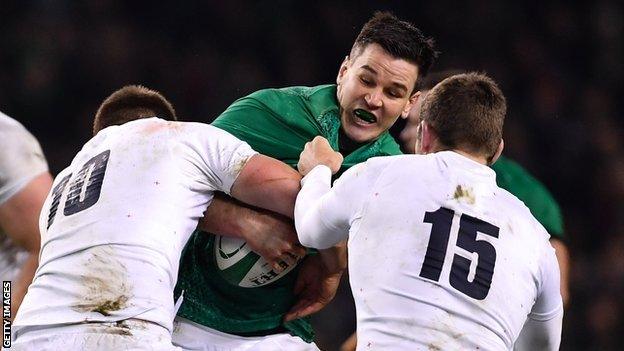Nations Championships: World Rugby revamp backed by £5bn offer
- Published

England's Owen Farrell and Ireland's Johnny Sexton were among the players to question World Rugby's initial plans, before the semi-final stage of the Nations Championship was dropped
World Rugby's hopes of reshaping the international game have been boosted after they revealed a £5bn offer to back their Nations Championship plans.
Six Nations organisers are considering selling a stake in the tournament to a private equity firm, potentially killing off World Rugby's plans.
But global sports marketing company Infront's Nations Championships offer is believed to have surprised unions.
"We live to fight another day," a World Rugby source has told the BBC.
As reported by the BBC on Monday, the planned semi-final stage of the Nations Championship has been scrapped, with World Rugby committed to working with players and clubs, after those parties voiced their opposition in recent days.
However, despite the commercial offer and the "well-received" proposal, issues over promotion and relegation remain.
France and South Africa have both given their initial support to the plans, while emphasising there are details to be worked on.
"The meetings were positive and constructive and there are still details to be worked through, but France believes in this concept for the good of the game globally," said French federation boss Bernard Laporte.
SA Rugby counterpart Jurie Roux said: "Creating a meaningful season-long competition out of the current patchwork of events and tournaments has an obvious appeal as well as proving a clear development pathway for emerging nations, which speaks directly to one of the fundamental goals of World Rugby.
"But there are a number of due diligences to be performed and questions to be answered before anything can come to fruition."
The Nations Championship, which would start from 2022, would involve a 12-team league, with results from the existing Six Nations, an expanded Rugby Championship and summer and autumn Tests contributing towards the final standings. The top two teams would play off in a final.
The proposal's plan to introduce relegation and promotion to the Rugby Championship and, especially, the Six Nations, is expected to be a major stumbling block, with players and clubs also raising concerns.
Pacific Island nations are considering a boycott of this year's World Cup in protest at the plan, amid fears that Samoa, Tonga and Fiji may not be included in the 12-team league.
Pacific Rugby Players' Welfare wants its 600 members to discuss a boycott.
England captain Owen Farrell and New Zealand skipper Kieran Read, external have said they are concerned about an increase in workload with more international matches scheduled.
Speaking last month, Farrell said: "This proposal shows no signs of improving an already difficult situation."
However, World Rugby chairman Sir Bill Beaumont said the plans had been "well received" after Thursday's meeting in Dublin.
"Everyone, not just the established teams, will benefit, accelerating the development and competitiveness of the global game," said Beaumont.
"However, as you would expect in an ambitious, complex and multi-stakeholder project, not everyone is in full agreement on the way forward, including the matter of promotion and relegation."
World Rugby vice-chairman Agustin Pichot added: "We are at an important time in our game's history.
"We have an opportunity to change the landscape of the game for the long-term betterment of all unions.
"We must work together to ensure the best possible future for our sport - a future where everyone is included and where everyone contributes to and benefits from a truly global game."
Infront's Christian Mueller said that his company's offer would provide the financial platform for the game's global growth.
"Our support will enable World Rugby and its member unions around the globe to elevate the game further whilst also providing long-term financial security, across all regions and levels," he said.
"We know how passionate rugby fans are and we want to ensure accessibility for fans globally, supporting World Rugby's vision to continue making the game a sport for all. It is in our interests to grow the audience to ensure it is an attractive proposition for both media and sponsors."